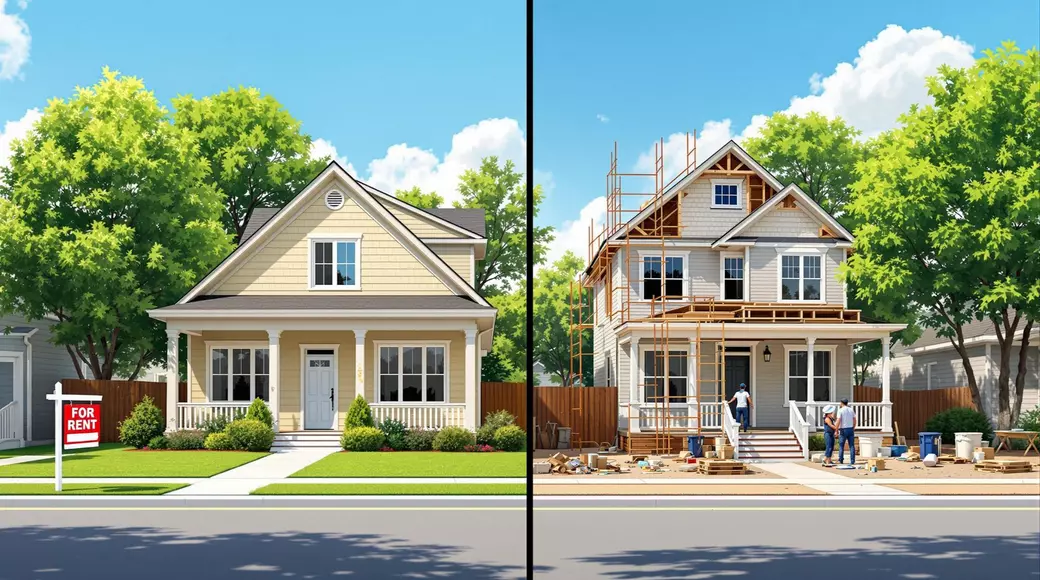Charlotte Real Estate Investment: Rental vs. Flip Properties

Charlotte Real Estate Investment: Rental vs. Flip Properties
Charlotte’s real estate market provides two primary paths for investors: rental properties and house flipping. Each strategy offers unique benefits and challenges, so understanding these options can help align your investment approach with your financial goals.
Rental Properties: Steady Income and Long-Term Growth
Rental properties are an excellent option for steady, long-term income. In Charlotte, the average monthly rent is approximately $1,800, with an annual yield of 6.34%. Property values in the area also appreciate at an average rate of 4.5% per year. With a low vacancy rate of 4.2%, rentals offer stability and consistent returns. Additionally, professional property management services in the area can assist with tenant placement, rent collection, and maintenance, making this option feasible even for out-of-state investors.
House Flipping: Higher Short-Term Returns
For those seeking quicker profits, house flipping can yield returns of 15-30% per project. Success in flipping depends on acquiring undervalued properties, managing renovation costs effectively, and selling at the right time. Charlotte’s real estate market, bolstered by a growing population and demand for renovated homes, is well-suited for this strategy. However, the risks are higher, including market fluctuations and upfront investment costs.
Understanding Rental Property Investments
Charlotte’s rental market is characterized by strong demand, fueled by a thriving job market in industries like finance, healthcare, and technology. Popular neighborhoods such as South End and Uptown command premium rents, often exceeding $2,000 for one-bedroom units. Rental properties offer income through monthly rents and long-term property appreciation, making them ideal for wealth-building over time.
Key factors to consider include:
- Location: Proximity to jobs and transit hubs drives demand.
- Growth Potential: Rental properties benefit from rising home values and increasing rental rates.
- Management Options: Property management companies make it easier to handle tenant relations and property upkeep.
For investors aiming for long-term stability and steady returns, Charlotte’s rental market remains a strong choice.
Understanding House Flipping Investments
House flipping is a high-reward, high-risk investment strategy. Charlotte’s growing population and demand for renovated homes make this a lucrative option for strategic investors. The key to success lies in identifying undervalued properties, planning renovation budgets carefully, and timing the market effectively.
Steps to Successful Flipping:
- Finding Properties: Focus on undervalued homes or areas undergoing development. Leverage connections with local agents to identify off-market opportunities.
- Managing Costs: Stick to the 70% rule—total investment should not exceed 70% of the property’s after-repair value.
- Market Timing: Purchase during slower seasons to minimize competition and sell when market conditions are favorable.
Flipping houses in Charlotte requires detailed planning, but with the right approach, it can lead to significant short-term gains.
Comparing Investment Strategies
Investors deciding between rental properties and house flipping should evaluate these factors:
- Returns: Rentals offer consistent annual yields of around 6.34%, while flipping can achieve higher short-term profits.
- Time Horizon: Rentals are a long-term strategy, while flipping is a short-term approach.
- Risk: Rentals present lower risk with steady demand, while flipping is more sensitive to market fluctuations.
- Management Needs: Rentals require ongoing management, whereas flipping involves intensive work during renovations but ends after the sale.
Both strategies can be profitable in Charlotte’s thriving market, depending on your financial goals and risk tolerance.
Conclusion
Charlotte presents exceptional opportunities for real estate investment, whether through rental properties or house flipping. The rental market provides consistent income and long-term growth, making it suitable for risk-averse investors. On the other hand, house flipping offers higher short-term returns but requires careful planning and execution.
To get started:
- Evaluate Your Resources: Assess your budget and time availability.
- Research the Market: Understand neighborhood trends and demand.
- Build a Network: Collaborate with local agents, contractors, and property managers.
- Start Small: Gain experience with one property before expanding your portfolio.
By aligning your strategy with your goals and leveraging local expertise, you can succeed in Charlotte’s dynamic real estate market.
Categories
Recent Posts











"Molly's job is to find and attract mastery-based agents to the office, protect the culture, and make sure everyone is happy! "
